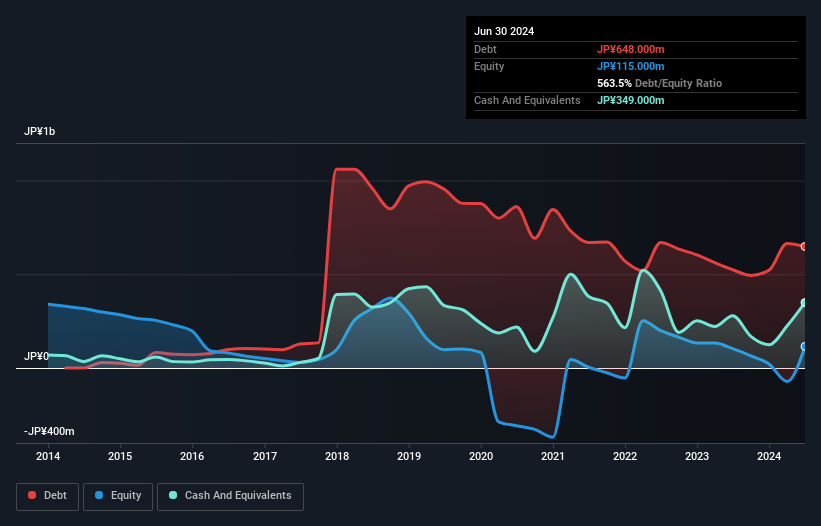
Warren Buffett famously said, 'Volatility is far from synonymous with risk.' It's only natural to consider a company's balance sheet when you examine how risky it is, since debt is often involved when a business collapses. Importantly, Wel-Dish.Incorporated (TSE:2901) does carry debt. But is this debt a concern to shareholders?
When Is Debt A Problem?
Debt assists a business until the business has trouble paying it off, either with new capital or with free cash flow. If things get really bad, the lenders can take control of the business. However, a more common (but still painful) scenario is that it has to raise new equity capital at a low price, thus permanently diluting shareholders. Of course, plenty of companies use debt to fund growth, without any negative consequences. When we examine debt levels, we first consider both cash and debt levels, together.
Check out our latest analysis for Wel-Dish.Incorporated
What Is Wel-Dish.Incorporated's Debt?
You can click the graphic below for the historical numbers, but it shows that as of June 2024 Wel-Dish.Incorporated had JP¥648.0m of debt, an increase on JP¥524.0m, over one year. However, because it has a cash reserve of JP¥349.0m, its net debt is less, at about JP¥299.0m.

A Look At Wel-Dish.Incorporated's Liabilities
According to the last reported balance sheet, Wel-Dish.Incorporated had liabilities of JP¥494.0m due within 12 months, and liabilities of JP¥403.0m due beyond 12 months. Offsetting these obligations, it had cash of JP¥349.0m as well as receivables valued at JP¥139.0m due within 12 months. So its liabilities total JP¥409.0m more than the combination of its cash and short-term receivables.
Of course, Wel-Dish.Incorporated has a market capitalization of JP¥15.4b, so these liabilities are probably manageable. Having said that, it's clear that we should continue to monitor its balance sheet, lest it change for the worse. The balance sheet is clearly the area to focus on when you are analysing debt. But you can't view debt in total isolation; since Wel-Dish.Incorporated will need earnings to service that debt. So if you're keen to discover more about its earnings, it might be worth checking out this graph of its long term earnings trend.
In the last year Wel-Dish.Incorporated had a loss before interest and tax, and actually shrunk its revenue by 25%, to JP¥2.1b. That makes us nervous, to say the least.
Caveat Emptor
While Wel-Dish.Incorporated's falling revenue is about as heartwarming as a wet blanket, arguably its earnings before interest and tax (EBIT) loss is even less appealing. Indeed, it lost JP¥79m at the EBIT level. When we look at that and recall the liabilities on its balance sheet, relative to cash, it seems unwise to us for the company to have any debt. So we think its balance sheet is a little strained, though not beyond repair. Another cause for caution is that is bled JP¥37m in negative free cash flow over the last twelve months. So suffice it to say we do consider the stock to be risky. When analysing debt levels, the balance sheet is the obvious place to start. But ultimately, every company can contain risks that exist outside of the balance sheet. To that end, you should learn about the 3 warning signs we've spotted with Wel-Dish.Incorporated (including 1 which can't be ignored) .
If you're interested in investing in businesses that can grow profits without the burden of debt, then check out this free list of growing businesses that have net cash on the balance sheet.
Valuation is complex, but we're here to simplify it.
Discover if Wel-Dish.Incorporated might be undervalued or overvalued with our detailed analysis, featuring fair value estimates, potential risks, dividends, insider trades, and its financial condition.
Access Free AnalysisHave feedback on this article? Concerned about the content? Get in touch with us directly. Alternatively, email editorial-team (at) simplywallst.com.
This article by Simply Wall St is general in nature. We provide commentary based on historical data and analyst forecasts only using an unbiased methodology and our articles are not intended to be financial advice. It does not constitute a recommendation to buy or sell any stock, and does not take account of your objectives, or your financial situation. We aim to bring you long-term focused analysis driven by fundamental data. Note that our analysis may not factor in the latest price-sensitive company announcements or qualitative material. Simply Wall St has no position in any stocks mentioned.
About TSE:2901
Wel-Dish.Incorporated
Develops, manufactures, imports, and sells food and beverages primarily in Japan.
Excellent balance sheet slight.
Market Insights
Community Narratives




